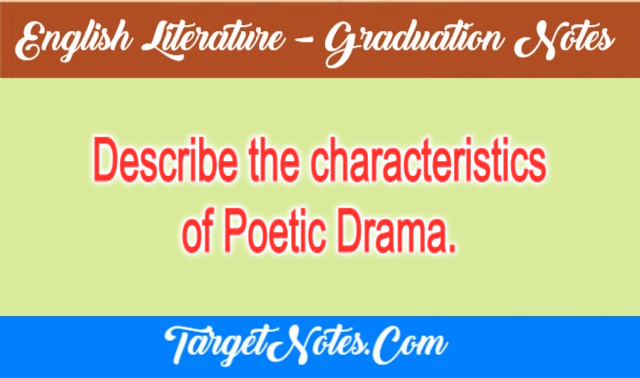
Contents
Describe the characteristics of Poetic Drama.
Or
Write an essay on the merits and demerits of Poetic Drama.
During 20th century, several new trends appeared in literature. Prose witty, serious, pathetic or ironical-was the accepted medium of drama. But that does not mean that poetic drama was dead beyond hope. At least a few early twentieth-century dramatists like Stephen Philips did write poetic drama. In the later years of the century, thanks to Yeats, Abercrombie, Bottomely, and most of all, T.S. Eliot, poetic drama came to its own once again and could thereafter compete with prose drama without needing any special excuses. In fact, in the twenties of the century there is a clear evidence of a marked reaction against the naturalistic drama of the earlier years; there is, conversely what Allardyce Nicoll in British Drama call’s, “a renascence of imagination,” The ascendancy of imagination and the challenge to realism took in the field of drama three divergent directions as below:
(1) The establishment of poetic drama.
(2) The coming into its own of the modernistic Continental School.
(3) The arrival of the historical dramatists.
The Chief Characteristics of Modern Poetic Drama-The poetic drama revived in England as a reaction to the realistic drama of Shaw and Galsworthy.
The protagonists of this movement wanted to introduce flavour, richness and poetry in drama. Their work was the result of their dissatisfaction with the intellectual drama in which everything proceeded logically.
They held it was possible to produce plays rich and copious in words and at the same time to give the reality which is the root of all poetry, in a comprehensive and natural form.
The poetic dramatists of the modern age thought that such plays dealing with the profound and common interests of life and full of poetic speech would be different from the intellectual plays of Ibsen and Shaw.
They tried to exploit in their the popular imagination of the British. The popularity of the poetic drama depended more on poetic charm and strangeness than upon dramatic power.
Stephen Phillips-But even before this “renascence of imagination” we find some dramatists writing verse drama in the early years of the twentieth century. Of these dramatists Stephen Phillips deserves first mention. Paolo and Francesca was his greatest achievement, though he wrote some other verse plays also, like Herod, Ulysses, The Sin of David, and Nero. His work is not original, for unlike T.S. Eliot, he does not try to subject an old traditional style to the needs of the modern age.
Nor did he found a tradition, though some dramatists like Rudolf Besier and J. E. Flecker tended somewhat in his direction. Besier’s The Virgin Goddess is written much in the same style as Phillips’. Flecker’s Hassan (publishd in 1922 and staged in 1923) is different in th sense that it is related to the Middle East. It does capture much of the gorgeous splendour of the East with its hedonistic lustfulness and grotesque sadism, but its characterisation and incidents (mostly of the melodramatic kind) are quite crude and incapable of interesting the more discerning of readers and spectators. There is some really splendid poetry also no doubt, but to quote Allardyce Nicoll, it is “a mere patch work of heterogeneous elements without harmony and without form.” Edward Knoblock’s Kismet (1912) is another Eastern phantasmagoria.
John Masefield- John Masecfield was not affected by the Middle East, but he was influenced a great deal-especially in his dramatic work-by the Japanese drama which was introduced in English for the first time in 1913. In the beginning Masefield tried his hand at domestic and historical themes, in such plays as The Tragedy of Nan, the prose play The Tragedy of Pompey the Great, and Philip the King (written in heroic couplets). The Japanese influence is perceptible first in The Faithful (1915), His later plays, mostly on religious and historical themes, show an appreciable evidence of the Japanese influence. Good Friday (1917). A King’s Daughter (1923), The Trial of Jesus (1925), Tristran and Isolt (1927), and The Coming of Christ (1928) are his important later plays. In them he skilfully combines prose and verse, and following the precedent of the ancient classical stage, introduces choral interludes. His language is well-wrought but lucid. His Christianity is quite conventional and as such unacceptable to the moderns. But there is a childlike quality in his conception and presentation which cannot go unobserved and uncommended.
John Drinkwater (1882-1937)- John Drinkwater is best known for his prose historical drama Abraham Lincoln (1918) which secured for him international fame But here we are concerned with his poetic dramas which came only before 1918 and which include the Storm (1915). The God of Quiet (1916), and X= 0; A Night of the Trojan War (1917). These plays were not as popular as Abraham Lincoln and even his other historical dramas like Mary Stuart and Oliver Cromwell. But they helped to promote and preserve the vogue of poetic play. The Storm is indeed very effective and puts one in mind of Synge’s Riders to the Sea. A young woman is waiting fearfully for her husband who was been overtaken by a furious storm. Her mind, torn between hope and fear, comes to a settlement with the bringing in of the dead body of her husband. The play is meditative rather than expressive of action.
Yeats and he Irish Movement- The Irish Movement contributed a lot to English drama, both prose and verse, the leader of the Irish Movement were W.B. Yeats (1865-1939) and Synge. Their followers were many and included some very talented writers. Synge wrote plays in a poetic language all his own, but it was prose not verse. Hence he will not detain us here.
Yeats was a poet of considerable powers. His poetic plays posed a serious challenge to the products of the realistic prose school. They were poetic not only in form but spirit also. They were full of rich symbolism, mystic esotericism, and delicate refinements which characterize much of his poetry.
Lascelles Abercrombie- Abercrombie’s verse plays, like Degorah (1913). The Adder (1913), The End of the World (1914), Staircase (1920), The Deserter (1922), and Phoenix (1923), struck a note of departure from the fanciful and symbolical plays of Yeats. Abercrombie had nothing to do with the land of fairies or mysticism. He was a poet, no doubt, but he was also a realist. He took upon himself the task of adapting the blank verse of the Elizabethan age to the contingencies of the modern times. Referring to Abercrombie’s work, Moody and Lovett maintain: “fundamentally”, Abercrombie endeavoured to bring his poetry into close contact with reality. He was not another singer from fairyland as was Yeats: “he deliberately departed from the Elizabethan tradition which kept so many writers of the past in its thraldom. Consciously he sought to find a form of blank verse expression which might adequately convey to modern spectators or readers the immediate emotions of our times in terms of poetry. The powerful resonance of his verse.
Dr. Gordon Bottomely-Whereas Abercrombie tried to poetise ordinary speech and thus combine poetry with realism. Dr. Gordon Bottomely endeavoured to make an altogether new start. In his search for a new poetic medium he did not turn to the Elizabethans or their Victorian imitators, but the no drama of Japan and the classical drama of Greece. In his youth Bottomely was an enthusiastic admirer of D. G Rossetti.
T.S. Eliot-T.S. Eliot has been the greatest shaping force in the literature of the twentieth century in poetry, criticism, and drama. Long before he came forward with a poetic play of his own, he had started defending poetic drama In The Possibility of Poetic Drama, The Need For Poetic Drama, Aims of Poetic Drama and Poetry and Drama he strongly advocated the cause of poetic drama. At one point, comparing prose and verse as the media of drama, he vonveyed his belief that “poetry is the natural and complete medium of drama, that the prose play is a kind of abstraction capable of giving you only a part of what the theatre can give, and that the verse play is capable of something much more intense and exciting.”
Related Link
- Write a short note on narrative technique of a novel.
- What do you understand by Novel? What are the elements which are to considered in plot construction.
- Define Growth of Post-colonial Literature: Feminism, Post-Modernism & Important Facts
- Define The Poetic Drama & Important Facts
- What is Epic Theatre & its Important Facts?
- What is The Expressionism & Important Facts to Remember?
- What is the Theatre of the Absurd & Important Facts
- Define Drama of Ideas & Important Facts.
- Define The Problem Play & Important Facts.
Disclaimer






